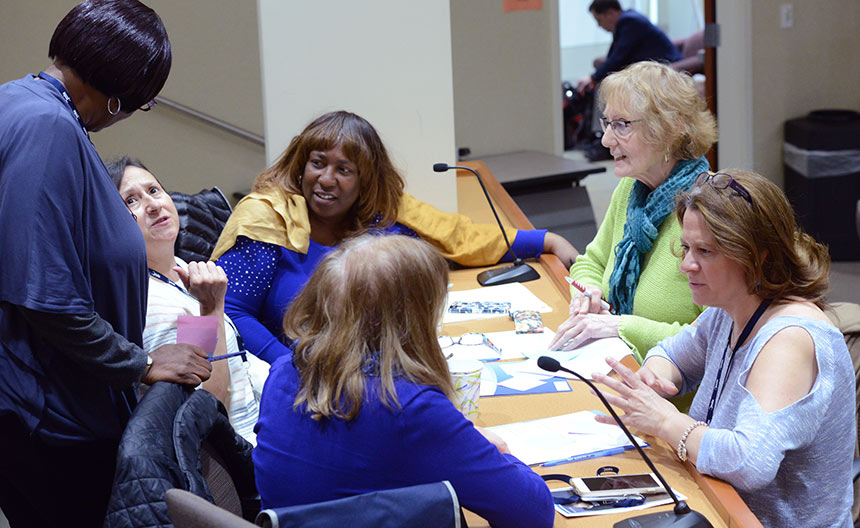The commitment of NYSUT's health care professionals was abundantly clear on Saturday when 85 of them showed up for an indoor forum, bypassing the first splendidly warm, sunny day in a long period dominated by grayness, wind and rain.
They spoke in earnest about sobering topics that have infiltrated schools, such as workplace violence, domestic violence, and active shooters — just one day after throngs of students rallied across the country in parks and outside state Capitols on the National Day of Action Against Gun Violence.
They learned too about health care as a right and recent research on home health care, and were provided tools to better understand brain injury.
And they listened to experts in the field talk about trauma toolkits for professionals who respond to, and care for, victims and survivors of trauma.
In schools, that’s become more common as students work with nurses, counselors, psychologists and social workers to overcome difficulties such as poverty, homelessness, family drug abuse, dating abuse, mental health challenges and alcohol abuse. Hospital and visiting nurse face similar situations regularly, as well.
“You are the way out for those children and patients,” said Anne Goldman, chair of NYSUT’s Health Care Professional Council and a winner of this year’s NYSUT’s prestigious Not For Ourselves Alone award.
In her welcome address at the 16th annual forum, Goldman reminded the professionals why their work is vital. “Someone who’s hurt cannot learn,” she said… “Someone who’s hungry cannot learn.”
Goldman spoke about how, through the union, health care professionals can level a playing field filled with bureaucracy and monopoly. This happens through legislation, advocacy, and best practice.
“Collectively we are significant,” she said.

Forum participants talk shop during a breakout session. Photo by El-Wise Noisette.
“It’s about standing up for each other, for workers and for the individuals you serve,” said Paul Pecorale, NYSUT second vice president overseeing health care.
He reminded forum participants that union workers earn about 20 percent more than those not in a union, and that unions advocate for on-the-job health and safety protections and workers rights.
Pecorale also told audience members that, if they are asked to sign a recommitment card to the union, they should ask themselves the following question: “Am I better off being part of something bigger, with a collective voice, or on my own?”
Health Care Professional of the Year Alicia Schwartz, a nurse home care coordinator, was honored at the forum for her work spending several weeks in Puerto Rico after Hurricane Maria, traveling throughout the devastated island helping people. Schwartz is a member of the Federation of Nurses/United Federation of Teachers and she grew up in Puerto Rico.
Her response to the disaster was part of a team coordinated by the American Federation of Teachers.
“It bothers me when people say: ‘What does the union do for me?’” Schwartz said. “It’s insulting. The union is about going beyond the workplace. Civil rights. Gay rights. Women’s march… We’re everywhere, even in disasters.”